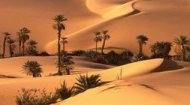|
Libyan Desert |
Libyan Desert |
Libyan Desert | Libyan Desert |
|
|

Libyan Desert FactsThe climate of the Libyan Desert is unequivocally one of the harshest on Earth. Rainfall is virtually non-existent, often going years without a single measurable drop. When it does occur, it is typically in localised, intense downpours that quickly evaporate or sink into the parched ground. Temperatures swing wildly, with scorching daytime highs often exceeding 50°C (122°F) in summer, plummeting to near-freezing temperatures at night. The relentless sun and low humidity create an evaporation rate that far outstrips any precipitation. Strong winds are common, often whipping up colossal sandstorms (haboobs) that can obscure visibility for days and reshape the desert's surface. These extreme conditions make the Libyan Desert an invaluable natural laboratory for studying adaptation to aridity and ancient climate patterns. The geological narrative of the Libyan Desert is exceptionally rich, stretching back millions of years. Much of its surface is composed of Nubian Sandstone, a vast formation laid down during the Mesozoic Era. Beneath this lie older crystalline rocks. The desert's dramatic features are the result of aeons of wind and water erosion, although evidence of past wetter climates, such as ancient river channels and lakebeds, is abundant. This geological history also accounts for some of its most intriguing phenomena, such as Libyan Desert Glass – a rare, naturally occurring tektite, believed to be the by-product of a meteorite impact that occurred some 29 million years ago. This yellowish, translucent glass, found uniquely in this region, adds another layer of scientific intrigue to the desert's mystique. Despite its formidable nature, the Libyan Desert has not always been devoid of human presence. Archaeological evidence, particularly in the Gilf Kebir and Uweinat regions, reveals a vibrant past. As noted above, cave paintings and rock engravings, some dating back over 7,000 years, depict elephants, giraffes, antelopes, and the daily lives of hunter-gatherers, providing irrefutable proof of a much wetter, greener Sahara during the African Humid Period. These prehistoric artworks serve as a poignant reminder of profound climatic shifts and the adaptability of early human societies. In more recent history, the Libyan Desert has been a stage for exploration. European explorers like Gerhard Rohlfs (19th century) and Ralph Bagnold (early 20th century) meticulously mapped its vastness, often relying on early motorised vehicles. During World War II, the desert became a crucial theatre for covert operations, most famously by the British Long Range Desert Group (LRDG), whose expertise in navigating these desolate lands was instrumental in intelligence gathering and raiding behind enemy lines. Their exploits further solidified the desert's reputation as a place of immense challenge and strategic importance. Beyond its historical and geological wonders, the Libyan Desert continues to yield scientific treasures. Meteorite hunters find it a fertile ground due to the lack of vegetation and the well-preserved nature of objects on its surface. Its extreme aridity also makes it an ideal location for studying exogeology, offering insights into the surface conditions of Mars and other arid planets. However, this magnificent wilderness is not without its challenges. Climate change continues to exert pressure, and while its vastness offers some resilience, the precious groundwater resources that sustain its oases are finite. Balancing scientific exploration and the conservation of its unique ecosystems and archaeological heritage remains an ongoing endeavour. The video explores the Libyan desert and shows examples of its ancient rock art. After you've watched it, why not check out our interactive map of the Libyan Desert below. |








